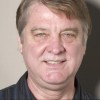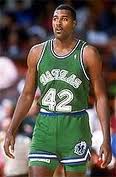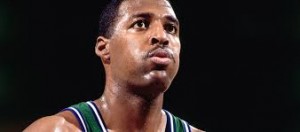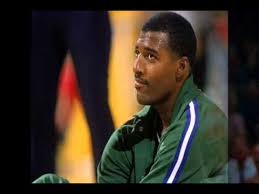 During his second year with the Mavericks, Roy Tarpley was 23 years old and on his way to winning the 1987-88 Sixth Man Award. He was a young man full of exuberance, already beloved by his teammates for two reasons:
During his second year with the Mavericks, Roy Tarpley was 23 years old and on his way to winning the 1987-88 Sixth Man Award. He was a young man full of exuberance, already beloved by his teammates for two reasons:
1. He was a great basketball player.
2. He was refreshingly naïve and perpetually happy.
Roy always had a smile on his face and was a wonderful teammate. Despite prodigious talent, he did not start because the Mavericks had a veteran accomplished power forward in Sam Perkins. But that didn’t bother Tarpley. He was truly happy to simply be playing basketball for a living.
 Whenever there was playful banter between teammates, Tarpley was always a part of it. He took more than he dished out, but that was fine with him. As refined and skilled as he was on the court, he was like a big happy, goofy teenager off it and that made him tremendously likable.
Whenever there was playful banter between teammates, Tarpley was always a part of it. He took more than he dished out, but that was fine with him. As refined and skilled as he was on the court, he was like a big happy, goofy teenager off it and that made him tremendously likable.
Tarpley would tell funny stories about himself. One night after a game, I ran into him in a convenience store and he had a six-pack of beer, a huge bag of chips and a bottle of Tabasco sauce. The next day at practice, I was telling some of the other players about his health food habits and Tarpley, laughing at himself, said:
“I love Tabasco sauce. When I was a kid, I used to drink it right out of a bottle. I’m serious. But when I went to the bathroom, I’d be hurtin’.”
On another day after practice, I was in the locker room joking around with Derek Harper, Rolando Blackman and Mark Aguirre. I had covered all three players for Dallas area newspapers since they had entered the league, so we were comfortable exchanging good-natured barbs.
At one point, the whole room was laughing about something and Tarpley approached me smiling and giggling and said: “Why they call you Hub? Everybody calls you Hub. Why they do that?”
I started to answer, “Well, Roy, my last name begins with . . .”
But then I stopped and it came to me – despite writing countless stories about the Mavericks and Tarpley, Roy had never read my byline. He had no idea what my name was.
 I told the story to several of my newspaper peers in other cities and every time I saw them, they’d say: “Why they call you Hub?” Twenty-seven years later, several of them still do.
I told the story to several of my newspaper peers in other cities and every time I saw them, they’d say: “Why they call you Hub?” Twenty-seven years later, several of them still do.
When I got my first email account, I was thinking about something original for an email address, something short that would be easy to remember, that story popped into my mind and I settled on “whyhub.” Years after that, it became my Twitter handle: @whyhub.
So Roy Tarpley has had what is obviously a small, but lasting and humorous effect on how I am identified. It was an innocent question asked with a big smile. It’s a good memory.
I thought about that story last week when Tarpley, who had a history of drug and alcohol problems, died in an Arlington, Texas, hospital at age 50. A cause of death was not released but the Mavericks were told Tarpley had kidney problems.
Regardless of the reason, it is sad to see a man who once was a world class professional athlete die at such a relatively young age.
Tarpley’s brilliance was so brief. He played only 280 games in his career, less than four full seasons, and started a mere 57 games.
There was one constant in his game – when he played, he was great. He was 6-11, 250 pounds and resembled Patrick Ewing – not as muscular and not as physical around the basket; but he had the same sweet mid-range jumper.
He was also a dominant rebounder not because he overpowered anyone, but because he had hands that were as skilled as a magician’s. Many of his rebounds were because he anticipated where the ball would bounce, he’d be quicker off the floor getting to it, and he would tap it to himself in a manner that was far more clever than it was physical.
In his first two seasons, he led the league in rebounds per minute played. As a rookie, he played only 18.7 minutes a game, but averaged 7.1 rebounds. The 36-minute projection was 13.7.
In his second season, he averaged 13.5 points, 11.8 rebounds in only 28.5 minutes per game. That projected to 17.1 points and 15 rebounds over 36 minutes.
In 1988-89, his third season, Tarpley played only 19 games because he spent 49 days in a rehabilitation clinic after getting two strikes in the NBA’s three-strikes-and-you’re-out program. But when he returned for the final six games of the season, he averaged 22.7 points and 13.3 rebounds while shooting .571 from the field in 33.7 minutes per game.
 In November 1989, Tarpley did not show at a practice and the Mavericks sent their “special assignments coach,” whose job it was to shadow Tarpley, to search local bars and nightclubs for him because that’s where he continued to hang out – not because he was a bad guy, but because he never was mature enough to grow up. He forever remained that big, goofy teenager.
In November 1989, Tarpley did not show at a practice and the Mavericks sent their “special assignments coach,” whose job it was to shadow Tarpley, to search local bars and nightclubs for him because that’s where he continued to hang out – not because he was a bad guy, but because he never was mature enough to grow up. He forever remained that big, goofy teenager.
At the time, I was working at Newsday and this is how I described Tarpley:
“There may be only one big man in the league better than Tarpley – [Hakeem] Olajuwon. In terms of basketball talent, Tarpley is Patrick Ewing’s equal, and may even be better.”
Before @whyhub is attacked, I went on to write: “But obviously, one Patrick Ewing is more desirable than 12 Roy Tarpleys.”
In 1990-91, he played only five games because of a major knee injury. Then he was suspended the next three years, although he spent some of that time playing in other leagues, including a stint in Greece.
But how good was Tarpley? In 1994-95, after almost four years of not playing in the NBA, he played 55 games and averaged 12.6 points and 8.2 rebounds in 24.6 minutes. The 36-minute projections were 18.4 and 11.9.
It is mind-boggling to think what Tarpley might have done if he had spent his life as a fitness fanatic rather than someone troubled by drugs and alcohol. He was a man with Hall of Fame talent but unending immaturity – a player with enormous unfulfilled potential whose major legacy is one he once so innocently asked, and one that he could never answer himself: Why?
Jan Hubbard has written about basketball since 1976 and worked in the NBA league office for eight years between media stints. Follow him on Twitter at @whyhub.
PROSPECTS BLEAK FOR DEREK FISHER; SHOULD HE OPEN AN IHOP?
ANY TRUTH TO GLOOM AND DOOM FORECASTS FOR SPURS?
CELEBRATING NAISMITH ON BASKETBALL’S 123RD ANNIVERSARY
MAGIC, LIKE MICHAEL, HAS A COMPETITION PROBLEM
TANKING USED TO BE SO MUCH MORE FUN
LAKERS ARE ALL KOBE, ALL THE TIME
DIRK NOWITZKI-LARRY BIRD: STILL NOT A VALID COMPARISON
MICHELE ROBERTS’ POSTURING REMINISCENT OF STERN
KYRIE WILL FIND OUT THAT LeBRON IS GOOD AT SHARING
SHOULD HARDEN TRADE STILL BE CURSED FOR THUNDER?
LAKERS ARE WORTHY OF, AHEM, PRIME TIME
A 44-MINUTE GAME? WHAT WOULD WILT SAY?
SMART MONEY IS ON THE SPURS
τετοιο ταλέντο σε αθλητή με αυτο το ύψος και αυτα τα κιλά οπως του roi
Και ταυτόχρονα με τόση χάρη και αρχοντιά δεν εχω ξανα δή
Απίστευτος !!!!!!!!!!!!
Good article Jan. Let me repost the comment I left at the ESPN story reporting Roy’s death. I think it clarifies some things about Tarpley’s ‘stint’ (as you call it) in Greece:
Tarpley played in the Greek league for two full seasons, between 1992 and 1994, spending time until his first suspension was over, and again for half a season in 1996, after he was suspended permanently from the NBA.
In his two-and-a-half seasons in Greece he played against Dominique Wilkins, Xavier McDaniel, James Donaldson, Cliff Levingston, Michel Wiggins, PJ Brown, Alfonso ‘Buck’ Johnson, Walter Berry and an array of major European stars.
At a time when basketball was something of a social phenomenon in Greece, Roy was one of the brightest stars of the Greek League, then the best in Europe. I bet there’s only a handful of 30-year olds in Greece who still don’t remember the name ‘Roy Tarpley’ today.
Greece was a country that gave Tarpley a second chance, and it’s the country he always returned to to escape his demons. He’ll be always fondly remembered here. RIP.
It’s sad, yes, but this guy had everything going his way and threw it all away. Millions of dollars…the chance to be famous…..becoming a world-class champion athelete…for what ???
What really intrigues me is how and why someone like this didn’t have problems BEFORE becoming a pro when he was in college. It’s like as soon as they get the $$$ they go downhill.